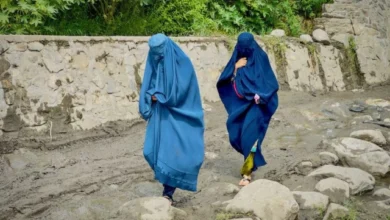Nayab review: The story of an average Pakistani girl who reached for the stars

In a country like Pakistan, where women often play second fiddle to their elder brothers in careers and ambitions, Nayab emerges as a symbol of passion and resilience, a hard-hitting punch against the glass ceilings that limit women from achieving success in our society.
Produced by Mandviwalla Entertainment, the movie starts with a powerful scene: Pakistan losing a match to India, with Nayab pledging to defeat India in a match — setting the stage for her journey.
Nayab, a middle-class girl, fueled by fiery passion, dreams of making it big in the competitive world of cricket. The question in the movie isn’t whether she succeeds as a cricketer or not, but how she does it, facing challenges posed by society at large. This Umair Nasir Ali film meticulously portrays every step of Nayab’s journey, gracefully manoeuvering through the innings of her life.
In retrospective discussions with my husband, we kept talking about the plots of Hollywood greats such as Remember The Titans or Million Dollar Baby and Bollywood masterpieces such as Dangal and Chake De! India. Although saying that, I really want to communicate that this movie doesn’t steal anybody’s plot but rather echoes the challenges that girls in our country are facing. The story is told in a way that would shine not just in front of domestic but international audiences, if this movie ends up on Netflix or Prime with subtitles.
Nayab is the story of every Pakistani girl, such as Kishmala Talat who became Pakistan’s first female pistol shooter to qualify for the Paris Olympics, Sarooj Sajid Hussain who won a gold medal in table tennis at the prestigious Saudi games in 2022 or Pakistani female powerlifter Saniha Gafoor who secured four gold medals in 57kg category during Oceania Pacific Powerlifting Championship in 2017. You might not have heard of these girls, but Nayab could be any of their stories. Nayab, however, is her own character, brilliantly written by Ali Abbas Naqvi and Basit Naqvi, and is absolutely larger than life.
The movie is made with what I like to call PPD — Pure Pakistani DNA — and shows the very essence of the country and our culture. It shows the good and the bad, things like random shootouts involving ‘namaloom afraad’, college girls asking a Noor bhai to mark their attendance in the register, a father (Jawed Sheikh) showering himself in cologne before going to a shendi, including even the cynicism that grips our nation with dialogues from the father like “ye mulk ab rehne kay qabil nahi raha [this country is worth no longer living in]” — there is a very important and poignant reason for the father’s statement, and it is worth watching the movie to find out.
But don’t let the doom and gloom spoil your discussion of whether the movie is worth watching with friends or family. Humour lies at the very heart of the film. However, this isn’t a typical funny flick — it’s more of a rollercoaster ride. The humour isn’t for a second taken as a token gesture for family entertainment — it’s absolutely genuine and heartwarming.
At many points throughout the movie, my husband and I, as well as the entire theatre audience found ourselves chuckling and becoming active participants in the scenes, viewing them as extensions of the memes we eagerly share with friends on social media.
Jokes revolving around recent amusing geopolitical situations, pop culture moments, and relatable desi-isms gave the movie a contemporary touch and made it all the more relatable for us. The banter between Nayab (Yumna Zaidi) the sister and Akbar (Fawad Khan) the brother was warm and relatable, making you root for these characters.
As we witness Nayab and her loved ones navigate the trials and tribulations of life, we’re taken on a whirlwind of emotions — from heartwarming triumphs to gut-wrenching setbacks. The cinematography paints Karachi in all its colourful glory, while the soundtrack ‘Mental Sa Dil’ sets the rhythm of the city’s heartbeat.
Director Umair Nasir Ali reflected on the profound connection between the narrative and the city itself, stating: “I think the era of the 90s in Karachi is something that we all experienced so vividly. The disturbances, the instability, and the events we witnessed with our own eyes — they all reside somewhere in our subconscious as memoirs.”
He said they “connected the bedrock of our story to the city of Karachi, to a family there, because the impacts somehow link back to the past. What Shahid sahab went through, and the way we portrayed Akbar’s story, shows how Akbar’s narrative is a reflection of that generation which witnessed the changes happening to themselves and their city firsthand, and how those changes affected them.”
The director showcased meticulous attention to detail in location selection, from Frere Hall, St Joseph’s College to Port Grand. Each setting appeared to be carefully chosen to enhance the atmosphere and depth of the storytelling. This attention to detail elevates the viewing experience.
I was also able to get in touch with Yumna Zaidi, the female protagonist of the film, who shared her thoughts about her debut film performance. “I’m really proud of my debut feature, Nayab. It’s focused, neat, and driven by the story. I absolutely loved the genuine feel of Nayab, and seeing how it resonated with all the audiences involved, evoking a powerful mix of emotions. It’ll always hold a special place in my heart and my career. Having Nayab as my debut film is truly delightful. Good storytelling leaves you craving more, and Nayab does just that.”
One small warning to the weak of heart, the movie delivers a gut-punch of a twist that’ll leave you reeling, so make sure you take some tissues with you, because you might need it.
The climax is poignant and powerful, driving home the message that dreams come at a cost — but sometimes, the price is worth paying.
With its powerful messages about determination, resilience, and the pursuit of dreams, this film is a must-watch for anyone who appreciates stories of triumph against adversity. From cricket enthusiasts to those seeking inspiration for their own endeavors, this movie offers something for everyone.
Nayab’s journey takes centre stage and slams home with a powerful ending: “Nayab — naam yaad rakhna [Remember the name].”



